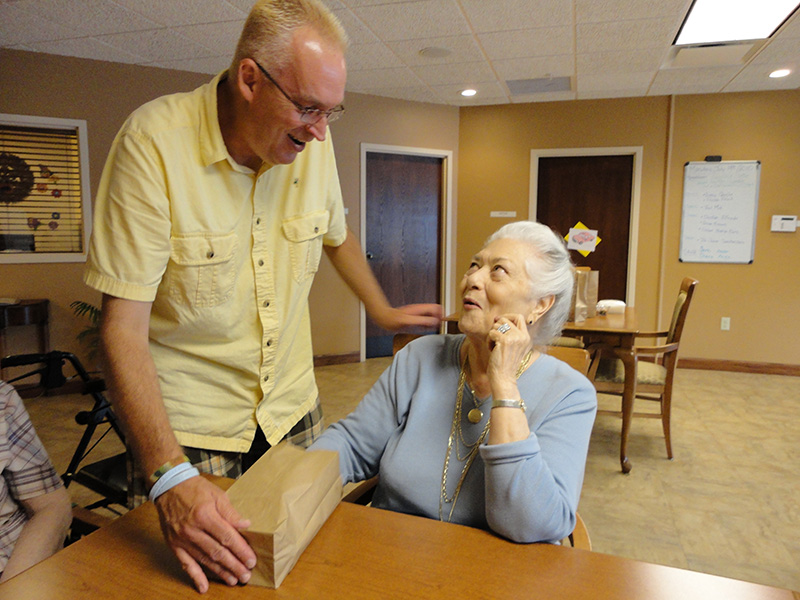Have you ever begun listening to a familiar song, and then felt magically transported to an earlier time and place in your life?
Music seems to have that kind of power over people, including people who have significant memory loss in many cases. At Heartwood we’ve found that music can inspire fond memories and bring happiness to our residents as they “remember” or feel the special meaning behind so many different melodies they grew up with. We’ve also found that music can be used therapeutically to help residents as they transition from one part of their day to another.
Music Helps Residents Adjust
The rhythm of the music we play is useful in helping our residents feel at ease at various times of the day, depending on what’s happening at Heartwood. Here are some general rules we’ve come up with:
- To awaken peacefully, use slower paced songs in the morning
- As the day progresses, choose music that makes people feel cheerful and energetic
- Select familiar music when we need to help residents adjust to a situation
- To help prepare for sleep, play slower paced music in the evening
- Play seasonal music on holidays such as during the Christmas season or on Independence Day to help residents feel a sense of time and place
Example 1
As an example of how we can use these types of rules, consider the situation when an environment becomes too stimulating. We can create a therapeutic environment by playing slower paced music, helping our residents feel a sense of balance.
Music and Memory: Recalling Happy Feelings
The general rules apply to music only generally because individuals react to familiar melodies in different ways depending upon specific events associated most closely with those melodies. The strongest feelings experienced by people are tied to songs that were popular in a person’s first twenty years of life.
We feel that this latter use for music is so important that we include it in our New Residents welcoming process. We ask each resident’s family to list their favorite cheerful music as well as their favorite calming music. Residents seem happier when they have their own personal playlists to listen to.
Example 2
As an example of how music can inspire fond memories, choose your generation from the list below, then listen to each of the songs included in its list by simply clicking each song title. Keep in mind that there is a difference of 17 years between the first part of a generation and the last part, meaning that perhaps not every song in your generation will feel quite so familiar to you. If you were born in the latter part of your generation, the songs you identify with most closely may be listed in the following generation’s titles.
Greatest Generation
People who are 87 years old or above at present.
- Maple Leaf Rag (Scott Joplin)
- Let Me Call you Sweetheart (Performed by Shannon Quartet)
- You Ain’t Heard Nothing Yet (Al Jolson)
- Rhapsody in Blue (George Gershwin – Performed by the Royal Philharmonic)
- My Blue Heaven (Gene Austin)
Silent Generation
People who are between 70 and 86 years old at present.
- It Don’t Mean a Thing (If You Ain’t Got that Swing) (Duke Ellington)
- Moon Glow (Benny Goodman)
- Cheek to Cheek (Fred Astaire)
- Pennies from Heaven (Bing Crosby)
- God Bless America (Irving Berlin – Performed by Kate Smith)
- God Bless the Child (Billie Holiday)
Baby Boomers
People who are between 51 and 69 years old at present.
- Someone to Watch Over Me (George Gershwin – Performed by Frank Sinatra)
- Hound Dog (Elvis Presley)
- Only the Lonely (Roy Orbison)
- Blowin’ in the Wind (Bob Dylan)
- I Want to Hold Your Hand (Beatles)
- The Sound of Silence (Simon & Garfunkel)
- Turn! Turn! Turn! (The Byrds)
- Light My Fire! (The Doors)
Generation-X
People who are between 35 and 50 years old at present.
- Sittin’ on the Dock of the Bay (Otis Redding)
- Good Morning Starshine (Oliver)
- Lookin’ Out My Backdoor (Creedence Clearwater Revival)
- Teach Your Children (Crosby, Stills, Nash & Young)
- Take Me Home Country Roads (John Denver)
- Take it Easy (Jackson Browne – Popularized by the Eagles)
- Go Your Own Way (Fleetwood Mac)
- Come Sail Away (Styx)
- Don’t Stop Believin’ (Journey)
Millennials
People who are between 19 and 34 years old at present.
- Should I Stay or Should I Go? (The Clash)
- Billie Jean (Michael Jackson)
- Sweet Dreams (Eurythmics)
- Livin’ on a Prayer (Bon Jovi)
- One Sweet Day (Mariah Carey and Boyz II Men)
- Maria, Maria (Carlos Santana)
- Clocks (Coldplay)
How did you feel when you listened to familiar songs? Were you able to recall any memories clearly from your earlier days? Did any particular song give you feelings of joy and longing? If so, then you can see why we think of music as being such an important part of our daily lives and a comfort to those who experience it.

